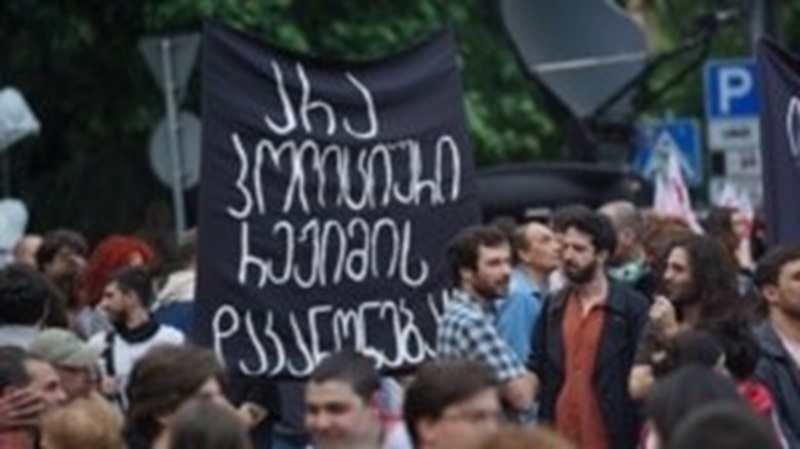Tbilisi's 'foreign witch hunt'
Controversial law ‘on the transparency of foreign influences’ promulgated, the ruling Georgian Dream party promises to ‘ferret out all foreign agents, traitors and spies’ starting with the ‘young people enlisted’ to stage the uprising. The walls of the houses of the deputies who voted for the measure are daubed with the words ‘slaves’. Opposition forces also denounce threats and intimidation.
Tbilisi (AsiaNews) - The speaker of parliament in Tbilisi, Šalva Papuašvili, has signed the much-discussed law ‘on the transparency of foreign influences’, expressing his thanks ‘to the Georgian people, who have once again shown their wisdom by not sinking into lies and hatred, showing everyone at home and in the world that there is only one side, the side of Georgia, and there is only one choice, that of defending Georgia’.
The law has already been published in the Official Gazette, and can therefore begin to be implemented at least partially, while it will come into full force within 60 days. The ruling Georgian Dream party then announced the start of the ‘witch hunt’, promising to ‘hunt down all foreign agents, traitors and spies’.
First of all, they will be looking for those responsible for the campaign against the law itself, the ‘young people enlisted’ to stage the insurrection of the new generation, and the ‘Collective National Movement’, the forces that coalesce at the main opposition party, which the majority deputies call the ‘National Spy Centre’.
The deputy of the flanking party ‘People's Force’, Guram Mačarašvili, therefore proposed to investigate all opponents of the law on charges of espionage, who are currently daubing the walls of the houses of the 84 deputies of the Georgian Dream with the inscription ‘Here lives a slave, traitor for 30 denarii’.
The infamous title of ‘slave’ is repeated not only in Tbilisi, but even at the airport in Paris, as happened to MP Eliso Bolkvadze, while MP Nino Tsilosani complains of being subjected to insults and telephone threats along with members of her family, including her minor children.
Papuašvili himself insists that ‘critics of the law and the established power have turned into radicals and extremists’, which makes repressive action by the judiciary and law enforcement agencies indispensable. He quoted a journalist who allegedly wrote that ‘the deputies who passed the Russian law deserve 84 bullets in the back of the head’.
The speaker then turned his accusations on the entire European Union for paying this and similar journalists, so ‘evidently they want to provide the ammunition for civil war’. According to the majority, those who do not accept the law ‘have lost their Georgian identity and put themselves at the service of foreign countries, but they will get an appropriate response’.
As repeated by several members of the government and the ruling party, the fight against the ‘terrorists’ will be carried out to the end, ‘we will clarify who their financiers are’. As soon as possible, support from abroad to NGOs that ‘deal with terrorising young children’ will be banned, Papuašvili adds, speaking of child aid associations, clarifying that ‘these groups have nothing to do with the Europe we want as Georgian society’.
In fact, threats to families and children also multiply against opposition MPs, as testified by Tina Bokučava of the National Movement, Anna Bučukuri of the ‘For Georgia’ party and independent MP Teona Akubardija.
Bokučava recounts that ‘those who phone us know all the numbers of family members, so they do it with precise instructions from above, and we want to address the operators of the companies and the inspector for the defence of personal data, up to the trial in court... in Georgia no one is afraid of them, despite all their threats and repression’.
According to Akubardija, ‘it is clear that the ruling regime wants to repeat the events of a century ago, when in 1921 the Bolsheviks shot masses of Georgian activists and branded them as spies and foreign agents’.
Another opposition MP, Paata Mangadžgaladze, commented ironically on Mačarašvili's proposal to arrest ‘spies’, comparing it to the latest corrections to the law on foreign agents passed in Russia, which prevents people from standing in elections: ‘Dear baton [godfather] Guram, you first put us all in a boat and push us into the water, so you can drown us whenever you want’.
Protest youth movements, such as the Dafioni students, decided to change the slogan of the demonstrations: no longer ‘No to Russian law’, but ‘No to the Georgian Dream’.







.png)










